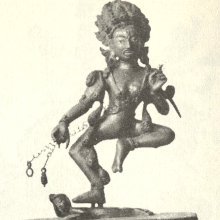Ratnadaka, Ratnaḍāka, Ratna-daka: 3 definitions
Introduction:
Ratnadaka means something in Buddhism, Pali. If you want to know the exact meaning, history, etymology or English translation of this term then check out the descriptions on this page. Add your comment or reference to a book if you want to contribute to this summary article.
Images (photo gallery)
In Buddhism
Tibetan Buddhism (Vajrayana or tantric Buddhism)
Source: Wisdom Library: Tibetan BuddhismRatnaḍāka (रत्नडाक) is the name of a deity presiding a group of four sacred districts, according to the Abhidhānottarottaratantra and the 9th-centruy Vajraḍākatantra.—Accordingly, Ratnaḍāka presides over the districts Kāmarūpa, Oḍra, Triśakuni and Kosala.
Source: Google Books: An Illustrated History of the MandalaRatnaḍāka (रत्नडाक) corresponds to the Buddha named Vajrasūrya and represents the main deity of the southern maṇḍala of the Pañcaḍākamaṇḍala, according to the Vajrapañjaratantra.
Source: academia.edu: The Structure and Meanings of the Heruka MaṇḍalaRatnaḍāka (रत्नडाक) is the name of a Vīra (hero) who, together with the Ḍākinī named Rūpiṇī forms one of the 36 pairs situated in the Vajracakra, according to the 10th century Ḍākārṇava chapter 15. Accordingly, the vajracakra refers to one of the four divisions of the sahaja-puṭa (‘innate layer’), situated within the padma (lotus) in the middle of the Herukamaṇḍala. The 36 pairs of Ḍākinīs and Vīras [viz., Ratnaḍāka] each have one face and four arms; they hold a skull bowl, a skull staff, a small drum and a knife; they are dark-bluish-black in color.

Tibetan Buddhism includes schools such as Nyingma, Kadampa, Kagyu and Gelug. Their primary canon of literature is divided in two broad categories: The Kangyur, which consists of Buddha’s words, and the Tengyur, which includes commentaries from various sources. Esotericism and tantra techniques (vajrayāna) are collected indepently.
See also (Relevant definitions)
Full-text: Kamarupa, Trishakuni, Koshala, Odra, Rupini, Vajracakra.
Relevant text
No search results for Ratnadaka, Ratnaḍāka, Ratna-daka, Ratna-ḍāka; (plurals include: Ratnadakas, Ratnaḍākas, dakas, ḍākas) in any book or story.
